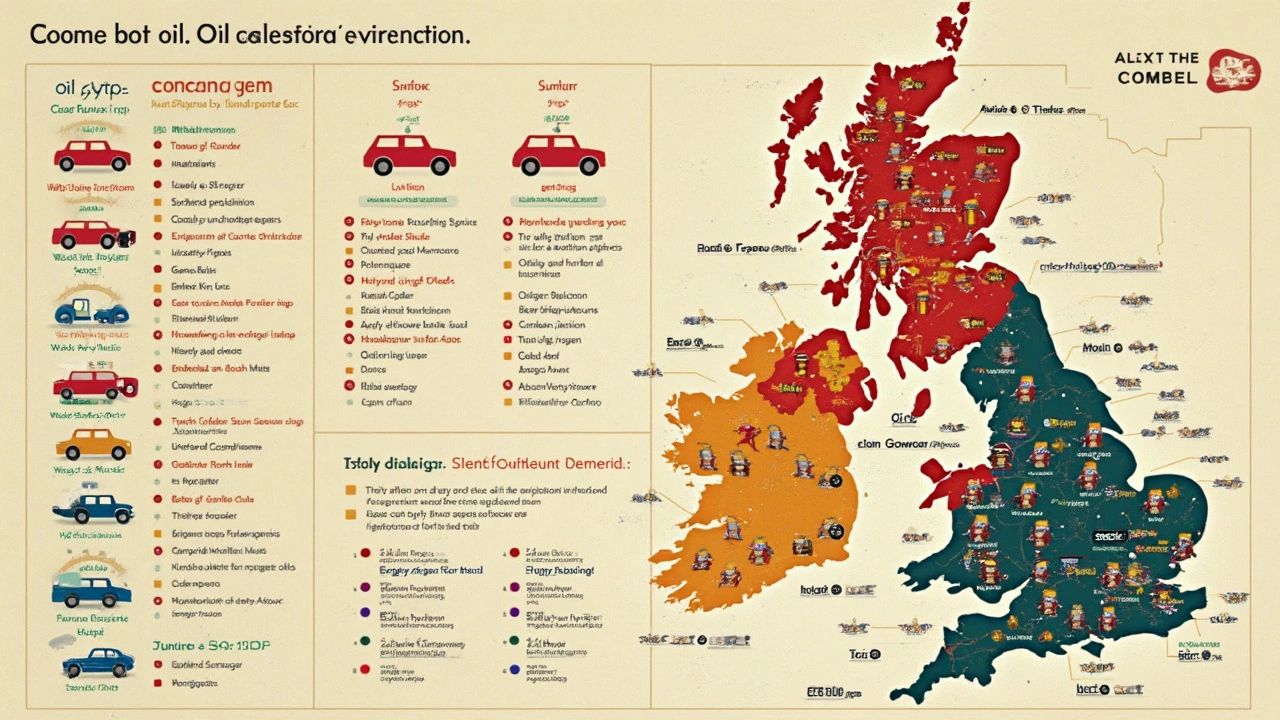Ever wondered if the oil you use in your car really makes a difference? You're not alone. Many folks think oil is just oil, but the truth is, it plays a huge role in how your engine runs. Choosing the right type can lead to better performance and lower maintenance costs.
The oil types out there can seem a bit overwhelming. You have options like synthetic, conventional, and blends. Each has unique features that suit different driving styles and conditions. Picking the right one isn't just about following what the manual says—it's about understanding what each type can do for your engine.
Let's break it down: oil isn't just about lubrication. It also helps with cooling, cleaning, and protecting your engine parts. Using the wrong type? It might not be a disaster, but it certainly won't do your engine any favors in the long run. So, next time you're at the shop, think twice before grabbing just any bottle off the shelf. Your car—and your wallet—will thank you.
- Understanding Oil Types
- The Role of Viscosity
- Impact on Engine Health
- Synthetic vs Conventional Oils
- Tips for Choosing the Right Oil
Understanding Oil Types
Choosing the right engine oil is more crucial than you might think. At first glance, the range of oil types might seem overwhelming, but each serves its own purpose. Let's delve into the three main categories: synthetic, conventional, and blends.
Synthetic Oil
Synthetic oil is like the premium version of motor oils. Made from high-quality chemical compounds, it's processed for optimal lubrication and engine protection. It's great for folks who drive in extreme temperatures or do a lot of stop-and-start driving. It typically lasts longer between changes, but it can be quite a bit pricier.
Conventional Oil
Then we have the trusty conventional oil. It's the old-school favorite; derived from refined crude oil, it's been around for ages. It works perfectly fine for everyday commutes but might not handle stress as well as synthetic. It's cheaper, sure, but you'll need to change it more often.
Blends
If you're looking for something in between, consider a blend. It's a mix of synthetic and conventional oil, aiming to give you the best of both worlds. You get improved performance without the full synthetic price tag. Blends are a good middle ground if you're not quite ready to go full synthetic but want more protection than conventional offers.
Choosing the right oil depends on your vehicle performance needs and your budget. Have a peek at what your car manual recommends, and match it up with how and where you drive. Realizing how oil types impact your engine can save you from costly repairs and ensure your car runs smoothly.
The Role of Viscosity
Alright, so let's talk about viscosity. It's one of those terms you hear thrown around in car discussions, but what's the deal with it? Viscosity is all about how easily the oil pours. Imagine it like this: the thicker, or more viscous, the oil, the slower it flows. And why does this matter? Because it directly affects how well your engine gets lubricated, especially when it's roaring at full power.
Think about those cold winter mornings. That's when viscosity really kicks in. If your oil is too thick, it won't spread around the engine parts well. But if it's too thin, it might just slide off without offering much protection. It's about finding that sweet spot, which is why the numbers on your oil bottle, like 10W-30 or 5W-20, are important. The first number indicates how thick the oil is in the cold, and the second shows its thickness at engine running temperatures.
Why the Numbers Matter
Here's a quick breakdown:
- The 'W' stands for winter. A lower number means it's better in the cold.
- The second number shows how it behaves when your engine's warmed up. Higher numbers offer more protection when the engine's hot.
Do you always need the same viscosity year-round? Not really. Some folks switch oils with the seasons. Thinner oils in winter and thicker ones in summer are a common choice for maintaining consistent protection.
Choosing the right viscosity is like picking the right shoe size. The fit needs to be just right for optimal performance. Next time you're eyeing oil options, keep those numbers in mind!
| Viscosity Grade | Climate Suitability |
|---|---|
| 5W-20 | Cold climates |
| 10W-30 | Moderate climates |
| 15W-40 | Hot climates |
By picking the appropriate viscosity, you're not just maintaining your engine oil; you're optimizing it for the best performance possible.

Impact on Engine Health
Choosing the right engine oil isn't just about keeping your car running smoothly. It's a critical factor in how long your vehicle will last and how well it performs over time. How does oil affect engine health? Let’s unpack this.
First off, the primary job of oil is lubrication. Without the right oil, engine components would grind against each other, causing wear and tear. Over time, this can lead to increased friction, which means more heat and eventually, engine failure. It’s why proper lubrication with suitable oil is key.
Heat Management
Engines run hot, and they need oil to draw heat away from crucial areas. A good quality oil can help manage temperatures and prevent parts from warping or malfunctioning. Synthetic oils often excel here, maintaining performance under high stress better than conventional oils.
Keeping It Clean
Engine oil also keeps things tidy. It scoops up dirt and particles, preventing them from sticking around too long. This is crucial because gunk can form in your engine, leading to clogs and costly repairs. Regular oil changes ensure that your engine remains clean, giving it a longer life.
Prevention of Corrosion
A little-known fact is that oil can help prevent corrosion. By creating a film over metal parts, it guards against oxidation and rust. This is especially important in damp or humid environments where corrosion is more likely.
Mileage Matters
Using the right oil can also improve fuel efficiency. Less friction means the engine doesn't have to work as hard, which means you could save a bit of money at the pump over time.
| Oil Type | Lifespan | Common Use |
|---|---|---|
| Conventional | 3,000-5,000 miles | Older or simpler car engines |
| Synthetic | 7,500-10,000 miles | Newer, high-performance engines |
So, next time you're planning on an oil change, think about what your vehicle performance needs. Picking the right oil is more than just a recommendation; it's a smart move for your car’s health and your peace of mind.
Synthetic vs Conventional Oils
Alright, let's get into the nitty-gritty of synthetic and conventional oils. If you've ever stood in the oil aisle feeling confused about which to choose, you're definitely not alone. These two types of oils are quite different, and these differences can impact how your car runs.
Understanding Synthetic Oils
Synthetic oil is like the high-tech version of engine oils. It's man-made, engineered for top-notch performance. This means it's designed to flow better at low temperatures and maintain stability in high heat. If you're someone who drives in extreme conditions or takes longer trips, synthetic might be worth the investment. Fancy brands often claim it provides better overall engine protection and improved fuel efficiency—something to consider if you're clocking a lot of miles.
Conventional Oils Explained
On the flip side, there's good old conventional oil. It's been around forever, and for the most part, it does its job just fine. It's refined from crude oil, less processed than synthetics, and let's be real—it's usually cheaper. If you're a laid-back driver who's sticking to regular commutes, conventional oil should suit your needs. But remember, it might need more frequent changes as it can break down quicker than synthetic.
The Cost Factor
Let's talk money because, let's face it, cost is a big deal. Synthetic oil is pricier upfront, but because it lasts longer, the price might even out over time. Conventional oil is cheaper per quart but requires more frequent changes. Looking at the long game, synthetic often gets the nod for value if you’re in the car for the long haul.
Making the Choice
How do you choose? Consider your car’s age, your driving habits, and the climate where you live. Many newer vehicles actually recommend synthetic, so checking your owner's manual is a good place to start.
To sum it up: both synthetic and conventional oils have their perks. Your choice depends on what matches your lifestyle and car needs. Make sure you’re keeping up with oil changes and your engine will purr like a well-fed cat, no matter which one you choose.

Tips for Choosing the Right Oil
Picking the right engine oil doesn’t have to be rocket science. But with all the choices out there, a few good tips can make the process a breeze.
Check the Owner's Manual
Your owner's manual is your best friend. Seriously, it’s like the ultimate guide to what your car needs. It’ll tell you the oil types that would keep your engine running smoothly.
Consider Viscosity
Viscosity matters. It’s all about how your oil flows at different temperatures. Check those numbers on the oil can like 5W-30 or 10W-40, and choose based on the climate you usually drive in. In colder climates, you're generally better off with lower numbers, so the oil stays fluid in the chilly mornings.
Think About Your Car's Age and Condition
Got an older car? It might benefit from thicker oil that can create a better seal in worn-out parts. In contrast, newer cars often prefer synthetic oils for better protection and efficiency.
Get to Know Different Oil Types
- Synthetic Oil: Usually superior in terms of protection and performance, especially under extreme conditions.
- Conventional Oil: Perfectly fine for standard driving and maintenance needs.
- High-Mileage Oils: Formulated for cars that have been around the block a few times—often more than 75,000 miles.
You can also explore blends if you’re looking for qualities in both synthetic and conventional oils. They offer some of the benefits of synthetic oil without the full cost.
Cost vs. Benefit
While synthetic oils might seem pricier upfront, they can lead to savings in the long run with fewer color oil changes and better fuel efficiency.
Don't Ignore Expert Recommendations
When in doubt, have a chat with your mechanic. These folks know cars like the back of their hand, and their insight can be invaluable.
A wrong choice might not wreck your car, but it's always better to play it safe with the right oil that fits your vehicle's unique demands. After all, a well-oiled engine is a happy engine!






